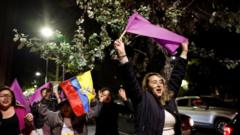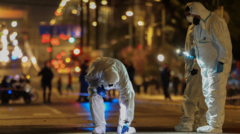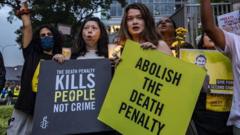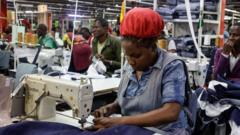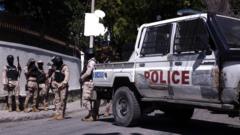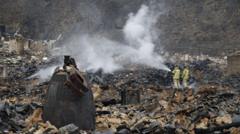The national high school drama competition in Kenya faced tumult when police intervened with tear gas during a controversial play’s performance, sparking protests among the students and raising concerns over freedom of expression.
Kenya's High School Drama Competition Erupts in Tear Gas Chaos
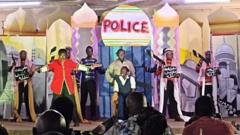
Kenya's High School Drama Competition Erupts in Tear Gas Chaos
Police disperse crowd during dramatic school play highlighting youth activism in Kenya
In a troubling turn of events during Kenya's national high school drama competition, police deployed tear gas to scatter a large audience gathered to watch a politically charged play titled Echoes of War. This production, presented by the students of Butere Girls School, boldly addresses the influence of digital platforms on governance and highlights the potential of youth to drive societal change—a reflection of Kenya's ongoing political struggles.
The play was initially barred from the festival due to vague reasons, but a High Court decision reinstated it, allowing it to compete. Tensions rose in Nakuru on Thursday when students protested the police's blockade against their scriptwriter, Cleophas Malala, who had been prevented from conducting essential final rehearsals with the girls. Although he was later released without charges, Malala commended the students for their courageous stand, emphasizing the importance of showcasing their work.
As police barricaded the venue and prepared for potential unrest, students exited in protest, singing the national anthem in solidarity. One student expressed their frustration, questioning the point of performing without an audience. Complaints of police harassment further fueled their discontent. The police's hasty response to disperse crowds drawn in by the prospect of the play led to public outcry about state repression and the suppression of free speech, with Amnesty International condemning the actions as part of a disturbing trend.
Opposition leader Kalonzo Musyoka criticized the police for their aggressive tactics and commended the students for refusing to perform under distressing circumstances. The Orange Democratic Movement demanded that the students be afforded the same opportunity to present their work as other competitors. The controversy highlights an increasing generational divide in Kenya, where youthful calls for change collide with established norms, amidst a backdrop of tumultuous protests that erupted in the past year.
With ongoing debates surrounding issues of freedom and expression within the Kenyan educational system, the fallout from the competition raises significant questions about the extent to which artistic endeavors can safely address pressing societal challenges in the country.
The play was initially barred from the festival due to vague reasons, but a High Court decision reinstated it, allowing it to compete. Tensions rose in Nakuru on Thursday when students protested the police's blockade against their scriptwriter, Cleophas Malala, who had been prevented from conducting essential final rehearsals with the girls. Although he was later released without charges, Malala commended the students for their courageous stand, emphasizing the importance of showcasing their work.
As police barricaded the venue and prepared for potential unrest, students exited in protest, singing the national anthem in solidarity. One student expressed their frustration, questioning the point of performing without an audience. Complaints of police harassment further fueled their discontent. The police's hasty response to disperse crowds drawn in by the prospect of the play led to public outcry about state repression and the suppression of free speech, with Amnesty International condemning the actions as part of a disturbing trend.
Opposition leader Kalonzo Musyoka criticized the police for their aggressive tactics and commended the students for refusing to perform under distressing circumstances. The Orange Democratic Movement demanded that the students be afforded the same opportunity to present their work as other competitors. The controversy highlights an increasing generational divide in Kenya, where youthful calls for change collide with established norms, amidst a backdrop of tumultuous protests that erupted in the past year.
With ongoing debates surrounding issues of freedom and expression within the Kenyan educational system, the fallout from the competition raises significant questions about the extent to which artistic endeavors can safely address pressing societal challenges in the country.







